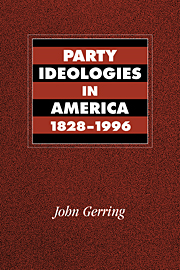Book contents
- Frontmatter
- Contents
- List of Figures and Tables
- Acknowledgments
- Part I Introduction: The Existence of Party Ideology
- 1 Arguments
- 2 Rethinking the Role of Ideology in American Party Life
- Part II The Whig-Republican Party
- Part III The Democratic Party
- Part IV Conclusions: Sources of Party Ideology
- Epilogue: 1996
- Appendix The Search for a Method
- Selected Bibliography
- Index
2 - Rethinking the Role of Ideology in American Party Life
Published online by Cambridge University Press: 05 June 2012
- Frontmatter
- Contents
- List of Figures and Tables
- Acknowledgments
- Part I Introduction: The Existence of Party Ideology
- 1 Arguments
- 2 Rethinking the Role of Ideology in American Party Life
- Part II The Whig-Republican Party
- Part III The Democratic Party
- Part IV Conclusions: Sources of Party Ideology
- Epilogue: 1996
- Appendix The Search for a Method
- Selected Bibliography
- Index
Summary
In looking at the role of ideology in American party life, it is helpful to disaggregate the concept of party into three components: (a) the party in the electorate (party voters), (b) the party organization (party campaign activities, activists, and leaders), and (c) the party in government (the party's role as policy maker). I am not concerned with the first component. Indeed, I am prepared to believe that party ideology is less meaningful as a cue for voters in the United States than elsewhere. On this level, the standard nonideological view of party politics in America may be correct.
This book is concerned primarily with the second component of partyness, the party as campaign or organization and, more schematically, with the third component of partyness, the party as policy maker. Before proceeding to the evidence, however, it is important to overcome certain objections to the general argument (that American parties are ideological). These objections rest not so much in an empirical debate as in a set of analytic assumptions about American politics. The parties are assumed to be innocent of ideology because it is difficult to envision how coherent and differentiated ideologies could endure in such a fragmented political structure. This chapter begins, therefore, with a review and reconsideration of various features of the American political landscape that might affect the ability of the parties to present themselves in an ideological fashion before the electorate.
Evidently, a party's campaign may be highly ideological without bringing any specific policy consequences in its train.
- Type
- Chapter
- Information
- Party Ideologies in America, 1828–1996 , pp. 22 - 54Publisher: Cambridge University PressPrint publication year: 1998



